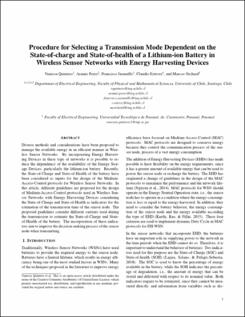| dc.contributor.author | L. Quintero, Vanessa | |
| dc.contributor.author | Perez, Aramis | |
| dc.contributor.author | Jaramillo, Francisco | |
| dc.contributor.author | Estevez, Claudio | |
| dc.contributor.author | Orchard, Marcos | |
| dc.date.accessioned | 2019-07-02T17:36:31Z | |
| dc.date.available | 2019-07-02T17:36:31Z | |
| dc.date.issued | 2018-09-24 | |
| dc.date.issued | 2018-09-24 | |
| dc.identifier.other | https://doi.org/10.1234/phmconf.2018.v10i1.520 | |
| dc.identifier.uri | http://ridda2.utp.ac.pa/handle/123456789/6151 | |
| dc.description | Diverse methods and considerations have been proposed to manage the available energy in an efficient manner in Wireless Sensor Networks. By incorporating Energy Harvesting Devices in these type of networks it is possible to reduce the dependency of the availability of the Energy Storage Devices, particularly the lithium-ion battery. Recently, the State-of-Charge and State-of-Health of the battery have been considered as inputs for the design of the Medium- Access-Control protocols for Wireless Sensor Networks. In this article, different guidelines are proposed for the design of Medium-Access-Control protocols used in Wireless Sensor Networks with Energy Harvesting Devices considering the State-of-Charge and State-of-Health as indicators for the estimation of the transmission time of the sensor node. The proposed guidelines consider different currents used during the transmission to estimate the State-of-Charge and Stateof- Health of the battery. The incorporation of these indicators aim to improve the decision-making process of the sensor node when transmitting. | en_US |
| dc.description.abstract | Diverse methods and considerations have been proposed to manage the available energy in an efficient manner in Wireless Sensor Networks. By incorporating Energy Harvesting Devices in these type of networks it is possible to reduce the dependency of the availability of the Energy Storage Devices, particularly the lithium-ion battery. Recently, the State-of-Charge and State-of-Health of the battery have been considered as inputs for the design of the Medium- Access-Control protocols for Wireless Sensor Networks. In this article, different guidelines are proposed for the design of Medium-Access-Control protocols used in Wireless Sensor Networks with Energy Harvesting Devices considering the State-of-Charge and State-of-Health as indicators for the estimation of the transmission time of the sensor node. The proposed guidelines consider different currents used during the transmission to estimate the State-of-Charge and Stateof- Health of the battery. The incorporation of these indicators aim to improve the decision-making process of the sensor node when transmitting. | en_US |
| dc.language | eng | |
| dc.language.iso | eng | en_US |
| dc.publisher | Proceedings of the Annual Conference of the PHM Society 2018 | en_US |
| dc.publisher | Proceedings of the Annual Conference of the PHM Society 2018 | |
| dc.rights | https://creativecommons.org/licenses/by-nc-sa/4.0/ | |
| dc.rights | info:eu-repo/semantics/openAccess | |
| dc.subject | MAC Protocols | en_US |
| dc.subject | WSN | en_US |
| dc.subject | SOC | en_US |
| dc.subject | SOH | en_US |
| dc.subject | Battery | en_US |
| dc.subject | MAC Protocols | |
| dc.subject | WSN | |
| dc.subject | SOC | |
| dc.subject | SOH | |
| dc.subject | Battery | |
| dc.title | Procedure for Selecting a Transmission Mode Dependent on the State-of-Charge and State-of-Health of a Lithium-ion Battery in Wireless Sensor Networks with Energy Harvesting Devices | en_US |
| dc.type | info:eu-repo/semantics/article | |
| dc.type | info:eu-repo/semantics/publishedVersion | |
